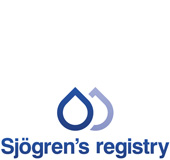For patients
Primary Sjögren's syndrome (pSS) is multi-system disease affecting between 0.3-1 % of the adult population (approximately half a million people in the United Kingdom). Ninety per cent of which are women generally aged between 40 and 60 years.
What are the symptoms of pSS?
Symptoms of pSS vary but typically include dryness of the eyes and the mouth, muscle and joint pain and chronic fatigue. These symptoms can be very
uncomfortable with sufferers experiencing a gritty, burning sensation to the eyes and difficulty swallowing dry foods. The dryness that is associated
with pSS means that patients are prone to eye infections which can lead to corneal abrasions, and also dental caries and poor oral hyigene due to the
lack of saliva in the mouth. Vaginal dryness adds not only to discomfort but also significantly affects sexual well being.
Chronic fatigue
can lead to feelings of depression and lower quality of life. Swellings of the salivary glands are not uncommon. In more serious cases other organs of
the body (e.g. arthritis, Raynaud's syndrome, vasculitis (inflammation of the blood vessels), lymphomas, neuropathies, lung and kidney involvement) can
also be affected.
What causes pSS?
What causes pSS is still unclear, but many scientists and doctors believed that pSS is an auto-immune disease because an abnormal production of
antibodies can be found in many pSS patients. It is also thought that these abnormal antibodies and/or other immune mechanisms start to attack various
tissues in the body instead of fighting infection.
The most commonly affected areas include moisture producing glands such as the tear and
salivary glands leading to dryness of the eyes and mouth. It is also believed that there is a genetic component (but it is likely that many different
genes are involved so it is uncommon for children of a pSS sufferer also develop pSS), with some evidence that the syndrome can be activated following
bacterial or viral infections.
How is pSS diagnosed?
Sjögren's syndrome is often under diagnosed because dryness of the mouth and the eyes can be due to a large number of causes especially in milder
cases. (This can also make early diagnosis of pSS difficult). Secondly, many non-specialist doctors may not be familiar with pSS. Thirdly, there is no
single test that we can use to diagnose pSS. Recently, scientists and doctors from across the world have devised an "international classification
criteria" for the diagnosis of pSS.
According to this criteria, a person is said to have a diagnosis of pSS if there are both objective signs and
symptoms of dryness including a characteristic appearance of a biopsy sample from a minor salivary gland or the presence of the antibodies anti-Ro (SS-A)
or anti-La (SS-B) in the blood. In addition, the person should not suffer from conditions (e.g. Hepatitis C, HIV, lupus, rheumatoid arthritis) that
are known to cause dryness of the mouth and the eyes, or have been exposed to drugs or treatment that can affect the moisture-producing glands.
Diagnostic tests for pSS include:
- Schirmer's eye test,
- Unstimulated saliva flow test,
- Radiologic salivary scans,
- Labial gland biopsy. (often referred to as "Lip" biopsy),
- Blood investigations for anti-Ro/La antibodies.
How is pSS being treated?
Currently there is no cure for this condition but several treatments are available to ease the symptoms, and patients should be monitored to prevent
organ damage. Sufferers of pSS should have regular visits to the dentists and ophthalmologist/opticians.
Treatments include:
- Artificial tears,
- Saliva replacement gels and saliva stimulants,
- Anti-inflammatory medication for joint pain,
- Immunosuppressive agents to reduce abnormal antibody production.
Are there any new treatments being developed?
Further research is desperately needed in order to gain a better understanding of this condition and to develop more effective treatments. The
United Kingdom Primary Sjögren's Registry (UKPSSR) aims to establish a group of 500 patients with confirmed Primary Sjögren's syndrome for future
academic and clinical research. If you are interested in taking part in the UKPSSR please contact Senior Research Nurse Sheryl Mitchell.
Currently, specialists from over 25 centres across the UK have expressed an interest in taking part in the recruitment, a full list of collaborating
centres can be found by downloading the following list:
Full list of Collaborating Centres ![]()
A list of the proposed research studies utilising the data from the UKPSSR can be found via the following link:
Proposed Research Studies ![]()
Where can I get more information about pSS?
Further information on pSS can be found on the websites below:
